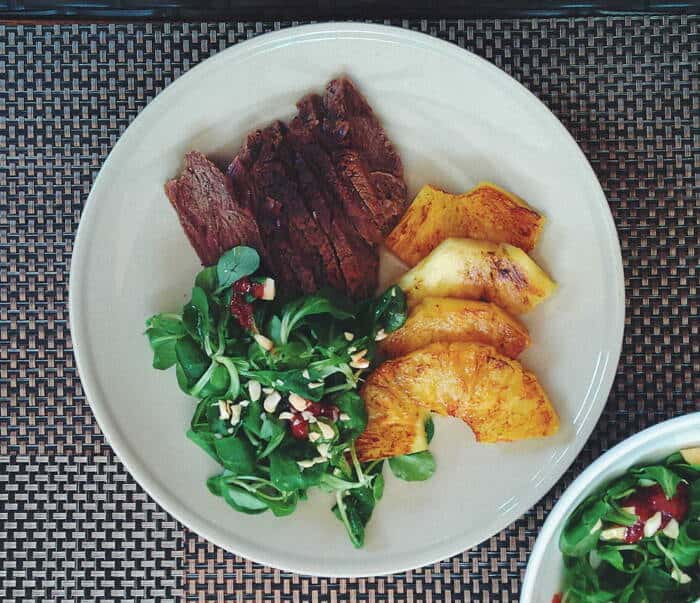What are the effects of eating pineapple at night? What are the benefits of eating it? Does it prevent you from sleeping? How to consume pineapple? Does it have any known disadvantages? Can we eat pineapple for breakfast? Can we eat the heart of the pineapple? And finally, what are its nutritional values?
I- Does Eating Pineapple at Night Prevent from Sleeping?
It would be very difficult to give a clear-cut answer to this question because eating pineapple in the evening 4 or 6 hours before going to sleep has multiple benefits that we will make you discover in the course of this article.
However, it is strongly advised not to abuse it or to eat it just before going to sleep, because pineapple consumed in this way can sometimes prevent you from sleeping.
II- Is It Good to Eat Pineapple Before Making Love?
First of all, it must be said that eating pineapple before making love does much more good than harm.
And this is for both men and women.
Even if it has not been the subject of several scientific studies, eating pineapple just before making love improves not only the smell and taste of the vagina but also the sexual secretions.
III- 7 Effects of eating Pineapple at Night?
# Is it Bad to Eat Pineapple at Night?
As you may have suspected, pineapple is full of sugar. So eating it in large quantities before going to sleep will certainly raise blood sugar levels and may even lead to high triglyceride and cholesterol levels.
So taking pineapple before just sleeping may cause weight gain and other health problems.
But on the other hand, it is known that this fruit is rich in melatonin and vitamin C, which means a drastic increase of these enzymes in the blood
This will help you to sleep deeply and for a longer time. This will help you sleep deeply and for a longer period, so you will have the most effective restorative sleep.
So it’s up to you to choose between galloping cholesterol and a night of very pleasant sleep.
What we advise you to do to take advantage of the multiple benefits of pineapple fruit and its juice is to consume it at least two to three hours before bedtime and in reasonable quantities.
This way your body will have time to digest it at its ease and at the same time take advantage of the melatonin that it brings to the body.
# Benefits of Eating Pineapple in the Evening (3 Hours Before Bed)
1- Ananas Facilitates Digestion
It should be noted that pineapple contains several nutrients and substances. It contains a very large amount of carbohydrates. However, you don’t have to worry because it also contains thiamine.
This not only gives you energy but also, and most importantly, helps to burn carbohydrates.
Similarly, pineapple contains manganese. The latter is an indispensable mineral, in the sense that it not only affects your metabolism but also allows you to lose weight in the best way.
Also, it should be noted that pineapple not only improves your metabolism but also can reduce bloating.
That’s why you are strongly advised to eat a few pieces of pineapple after eating a heavy meal. By doing so, you reduce the risk of constipation, bloating, and gas.
2- Ananas Helps You Sleep Better
Pineapple is a fruit that facilitates digestion when taken right after a meal as a dessert. By promoting good digestion, it allows you to sleep better.
It is advised, as we said above, to consume it in an interval of 4 to 6 hours before going to bed.

3- Eating Ananas Helps to Lose Weight
It is recommended to consume pineapple at certain times if you want to lose weight.
Even though it is a low-calorie fruit, because it contains 52 kcal per 100 g, it has a fat-burning action that is increased tenfold if you eat it on an empty stomach in the morning.
You can also consume it after eating or after doing sports. This is the only way you can increase your chances of losing weight by eating pineapple.
4- Strengthening the Immune System with Ananas Juice
Pineapple is a fruit that also contains several vitamins. Indeed, it is a fruit that can prevent winter diseases such as colds, flu. And this is due to the vitamin C it contains.
Also, pineapple fights against ear infections and all kinds of allergies. All this makes pineapple a fruit that strengthens the immune system.
5- Anti-inflammatory Action
Pineapple has an effective anti-inflammatory action. It is a fruit that can assimilate proteins.
It should be noted that it is with the help of bromelain, an enzyme with recognized therapeutic virtues found only in pineapple, that it has this ability.
Pineapple thus helps to better protect the body against the risk of bacterial infections.
Similarly, this enzyme can prevent blood clotting on the one hand and can prevent the development of certain diseases or tumors on the other hand.
For the record, the discovery of the high concentration of bromelain in pineapple stems was made by one of the doctors of the Pineapple Research Institute of Hawaii named Ralph Heinicke.
Bromelain is recognized as a proteolytic enzyme that accelerates the metabolism of proteins by breaking them into small pieces. As a result, it destroys harmful proteins that are found in the body.
6- Ananas for Bone Strengthening
Pineapple contains a good amount of manganese. Manganese is known as a chemical component that plays an important role in building strong and healthy bones and maintaining them.
Therefore, the consumption of pineapple is strongly recommended to the elderly to prevent the risk of osteoporosis and to children for the good growth of their bones.
7- Improves the Taste of Female Intimate Secretions
Pineapple, as we said above, improves vaginal secretions in a big way. According to Women’s Health, the ability of pineapple juice to improve the taste of female intimate vaginal secretions is not a myth, but rather a reality.
Although scientific research on the subject is almost non-existent, since the sense of smell is subjective, some researchers have nevertheless confirmed that consuming pineapple before sex significantly improves the flavor and smell of a vagina.
If you take the beverage, you are going to enjoy more benefits for the female sex.
IV- How to Consume Pineapple?
There are several ways to consume pineapple. The simplest way is to cut it into slices.
It is recommended that you cut it lengthwise because it is sweeter at the base.
Take care, as you do for the melon, to remove the central part a little hard and separate the flesh from the peel.
It is a fruit that makes refreshing and fragrant desserts. Moreover, it gives an exotic touch to classic desserts: compote, crumble, clafoutis, etc.
It can also be used to make a fruit salad or tropical cocktails.

V- Can We Eat Pineapple for Breakfast?
It is recommended to consume the fruit at breakfast. By doing so you will bring more nutrients than calories to your body.
Pineapple is one of those fruits that can be eaten in the morning. Consumed at breakfast, it can cure colds, relieve the pain of arthritis and heal internal wounds.
Despite the good effects of eating pineapple at night, I personally prefer to enjoy it in the morning to fill up on energy to face the long day!
VI- Does Pineapple Have any Harmful Effects?
Food allergies to pineapple are frequent. Specifically, it is a fruit that belongs to the family of “histamine-liberating” foods.
In the body, the consumption of pineapple leads to a release of histamine. This can sometimes cause allergic reactions (hives) in predisposed subjects.
VII- Can We Eat the Heart of the Pineapple?
You can eat pineapple core because it contains high levels of bromelain, an enzyme that benefits your entire digestive system by helping it break down proteins better.
This enzyme also acts as an anti-inflammatory.
You are advised to chew the pineapple core well, as it is the toughest part of the whole fruit.
VIII- Calories and Nutritional Values of Pineapple
Here are the calories and nutritional values that you will have by consuming 1000 g of raw pineapple: 50 kcal, 11 mg of Phosphorus, 146 mg of potassium, 15 mg of Magnesium, 0.09 mg of Vitamin B6, 0.08 mg of Vitamin B1, 18 mg of Vitamin C, 1.2 g of Fibers, 86.5 g of water, 11.3 g of Carbohydrates, 0.2 g of Lipids and 0.4 g of Proteins.